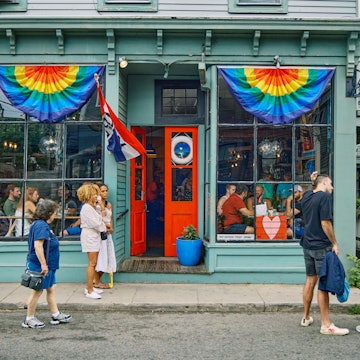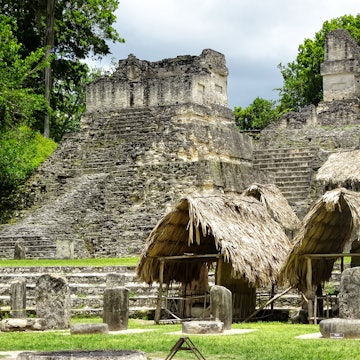
Xs or Os? Gatekeeping language is a distraction, however you spell โLatinxโ

Nov 25, 2020 • 6 min read

Language has evolved in the hundreds of years since Columbus landed on Hispaniola ยฉ Hisham Ibrahim / Getty Images
ฬวะฤดซรฝ recently published an article on where to celebrate Latinx/Hispanic culture around the US by a writer who self-identifies as "Latinx". It drew some debate with readers around the use of the word "Latinx". Of course, there are a lot of varied opinions on any topic like this, and it opened up a discussion for the ฬวะฤดซรฝ team on how we, as travelers, can inform ourselves to use terms with respect and understanding. We asked travel writer who has written extensively on decolonizing travel culture to further explore the relationships between race, identity and language.

Language can bond communities together, but when it comes to Spanish, considering the vast racial, ethnic, and national diversity of the 52 million Latinxs in the US, some will inevitably be left out of the conversation. Besides many not knowing or having any interest in learning Spanish, Spain was not alone in its colonizing of Mexico down to Argentina and their surrounding islands. The speaking of Portuguese, French, Afro-Caribbean English, and many Indigenous languages, plus the innumerable dialects of Spanish worldwide, including North American E/Spanglish, make it pretty laughable to imagine that the language hasnโt โ or shouldnโt โ evolve from the time when Christopher Columbus landed on Hispaniola.
And yet, in the insufferable year of our lord 2020, white and mestizo American men, mostly, are still policing language, from the sentiment that Black and Afro-descendant Latinxs donโt speak โproperโ Spanish to the tantrums over neutralizing the gender-specific term โLatino,โ the common defense being that changing it to reflect gender diversity is some sort of American conspiracy against the sanctity of what Javier Wallace, of and , calls โThe Queenโs Spanish.โ I spoke to him and Michรฉ of about their relationships with the colonizer languages of both English and Spanish when it comes to articulating their own identities.

โI have no attachment to the Spanish language,โ Javier told me over the phone. Heโs a co-founder of AfroLatino Travel, which leads tours to Latin America that center Black culture. โI recognize the importance of being multilingual,โ he continued, โbut with my own history, Spanish wholesale is a colonial language that was forced upon me and my relatives.โ Javierโs great grandparents migrated from the Anglophone former British West Indies to Panama to seek opportunities in building the Panama Canal and other projects. โMy grandfather is 91, my grandmother is 89, and they prefer to speak English over Spanish any day of the week because they were discriminated deeply for being both English speakers and Black.โ Their experiences did not improve when they adopted Spanish. โSo when they call us Latino or Latinx, or even talk about โLatinidad,โ" or what we can call 'Latino-ness', โit has a lot of baggage for me. Postcolonial history is complex.โ
Michรฉ is a Two-Spirit Latinx affiliate of Latino Outdoors, an organization that aims to further connect Latinxs to nature. Native folks across the Americas often use the term Two-Spirit to articulate a relationship to gender that predates the colonially-imposed gender binary and the word โtransgender.โ Over email, they told me that they are endeared to the term Latinx for its gender inclusion. โI have changed many times,โ wrote Michรฉ, โ[but] these days I call myself "Latinx,โ โAztecโ or โMexica,โ (pronounced Meh-shi-ka, the original name for Aztecs before the Spanish arrived), โand โTwo-Spirit,โ since I'm transgender and that feels more aligned with my Indigenous heritage.โ Michรฉ attempted to assimilate after suffering racist harassment throughout their youth, saying, โIt's embarrassing now, but I used to [say] that my family was actually from Spain. I started to believe that proximity to Europeans or whiteness meant safety,โ they wrote me. โThese days, I'm like 'f*** that.' I'm super proud of my heritage and I've done a lot of work to reconnect with my roots.โ
Javierโs relationship to โLatinidadโ draws more from his experiences with Latin American whiteness rather than US American whiteness. โI don't use 'Latino' for myself or even say 'Latin America' but 'predominantly Spanish-speaking countries.' [The term] 'AfroLatino' also served a purpose to acknowledge African heritage, but it has gotten to a point that it has actually become violent towards Black people.โ It is widely unknown that of the 10.7 million Africans who survived the Middle Passage when they were trafficked into the slave trade in the Americas, about 400,000 were taken to North America and the vast majority to Latin America. And as we see in these debates over โLatinidad,โ anti-Blackness in Latinx communities is alive and well.
โWhen I walk into a room of Hispanic people,โ Javier said, โpeople are looking at me like, โuh, the Black organization is next door.โ To be Black is what 'Latino' was constructed off of. Here in the US as a person who has [Panamanian] heritage, 'Latino' does nothing for me. Not one thing.โ

But the X-in-Latinx โdebateโ has more to do with gender. Michรฉ finds the anti-X manifestoes and squabbles that proliferate online to be โpointless. Semantics at best, language policing at worst.โ They continued, writing, โI am open to discussing the complexities of gender and racial identity, but not with people who are just trying to 'win' an argument. It feels like a waste of energy.โ
Javier concurred, telling me, โsome people just like to talk.โ I laughed. These arguments over a letter derail a wider conversation on the ideology that language is only a reflection of. โTheyโre usually pulling from this idea of American-derived corruption of Spanish, which ties to this unbreakable relationship they have to the madre patria [motherland], which is Spain, when discussions of gender and sexuality have been happening in these countries. Theyโre not new.โ
I first learned alternative spellings of gendered Spanish terms from Latin American queer and feminist movements online in the early 2000s, and not from the US. Those who deviate from โLatinoโ or โLatinaโ are not trying to interrupt gendered Spanish, but rather calling attention to Spanish interrupting gender-inclusive Indigeneity. As Javier concluded, โThere are Indigenous groups in Latin America whose worldviews and constructions of gender are very much not in tune with Western standards, and that is way older than 1492.โ
As a gender/queer Latinx person of Native and white descent, the X is more of a means to an end, and just as women and trans people people of color have taken the artifact of colonial language and shaped it into an ever-changing tool, Iโm eager to see what comes next โ what lies beyond the X.
You might also like:
How Black LGBTIQ+ travelers navigate a challenging world
Travelling While Black: "My skin color has created a box, and I am shoved into it"
Latin American and Caribbean Carnivals for every traveler










